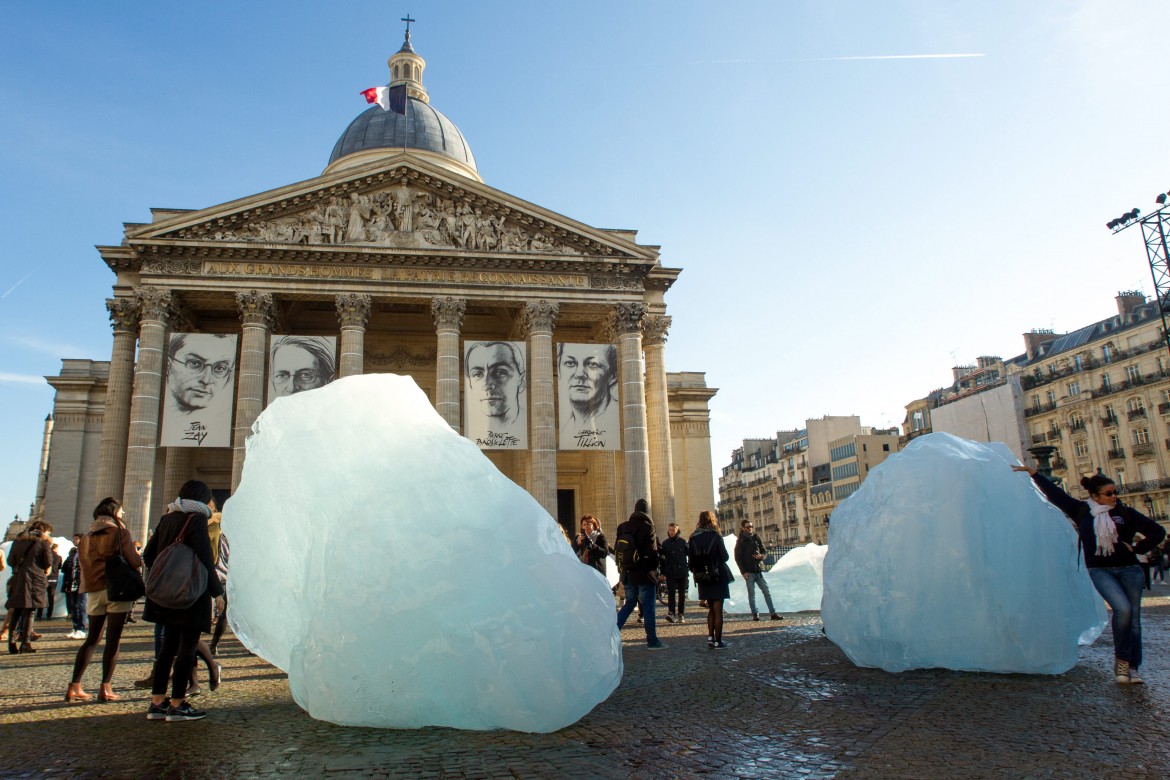Climate change
Will COP21 end with a mini-agreement?
As the final text sheds pages, some worry that Paris will be a repeat of 2009 in Copenhagen: a three-page, non-binding handshake.

Eighty tons of ice, which the artists Olafur Eliasson and Minik Rosing removed from the disintegrating Greenland ice sheet and brought to the Place du Panthéon in an evocative installation, are gradually melting in the mild Paris air.
At COP21, an agreement is also thawing, in the sense that the first 55-page draft, drawn up in Bonn in mid-October, passed its first hurdle and, last night, passed through a further compromise into a neat 32 pages.
This is a piece of good news. There are fewer brackets, as negotiations have reduced the number of points in dispute from 140 to 75. And the number of “options” — versions of the final deal — were also halved, from a little more than 200 to 100.
The thaw, however, should not be exaggerated: In Copenhagen in 2009, COP15 failed because the last version was three pages long and entirely unenforceable. It was bare bones in part because of general dysfunction and partly because of a Danish blitz to salvage the meeting, namely by drafting an alternative in secret.
The same temptation exists at COP21. According to environmental NGOs, it would be a defeat for everyone if France, determined to obtain some semblance of success at any cost, was secretly working on some minimized accord.
French leaders are showing signs of anxiety. At the meeting’s halfway point Friday, Foreign Minister Laurent Fabius, president of COP21, warned: “We’re not there yet,” and we must “accelerate.”
On Saturday morning, the version chiseled by 7,000 technocratic negotiators, who have been working all week, was to be submitted to Fabius. Now, between Monday and Wednesday, higher-level ministers will weigh in on the text of any final agreement before the meeting closes Dec. 11.
For Dec. 12, Interior Minister Bernard Cazeneuve has accepted the idea of a “demonstration” — it is still unknown in what form — of civil society, as had been expected before the attacks on Paris. (Protests on Nov. 29 were canceled, and there were riots and violent interventions by the police against those who dared to challenge the French ban on assembly). Cazeneuve said demonstrators must “define the terms” and “prevent violence.”
This weekend, civil society will make its own climate proposals at the Village of Alternatives, in the suburb of Montreuil. Joining them are some 700 mayors from around the world, gathered to exercise “positive pressure” on the negotiators, under the chairmanship of Paris Mayor Anne Hidalgo and the former mayor of New York City, Michael Bloomberg, a special U.N. envoy. The world’s cities, which concentrate 50 percent of the global population (and 70 percent of CO2 emissions), will be the ones translating national commitments at the local level.
Now, the main obstacle for the negotiators at COP21 in Le Bourget is funding.
Article 6 of the draft agreement, which touches this delicate subject, still has 18 options, ranging from a clear commitment of northern developed countries to vague promises. Southern countries want specific, legally binding commitments.
Nozipho Mxakato-Diseko, South African ambassador and spokeswoman for the Group of 77 and China (which actually comprises 134 countries), warned: Funding “is a legal obligation under the Convention. Finance support from developed countries relates to the impacts of historical emissions, which will only get worse with time for developing countries.”
In Copenhagen, countries promised $100 billion each year to developing countries, starting in 2020. The entirety of actual contributions so far is a tenth of that, and much of the aid included has nothing to do with reducing CO2 emissions.
The global South also calls for specific commitments on technology transfer. The North has balked, asking countries now “emerged,” such as China, to join them as funders. But the South, led by India, says countries historically responsible for CO2 emissions should have to pay more. But here again is the problem of China (and others), which today are a major source of greenhouse gas.
Tensions remain on other points, as well. As in the past, little money is being set aside to help poor, vulnerable countries adapt to the effects of climate change already upon them, such as flooding or drought.
As the mayors arrived in Paris, President François Hollande said, “We have to act for a time when we do not exist.” But Fabius stated: “There is debate as to whether we will have an objective with precise figures for 2050.”
Originally published at http://ilmanifesto.info/cop21-alla-ricerca-di-un-compromesso/ on 2015-12-07
